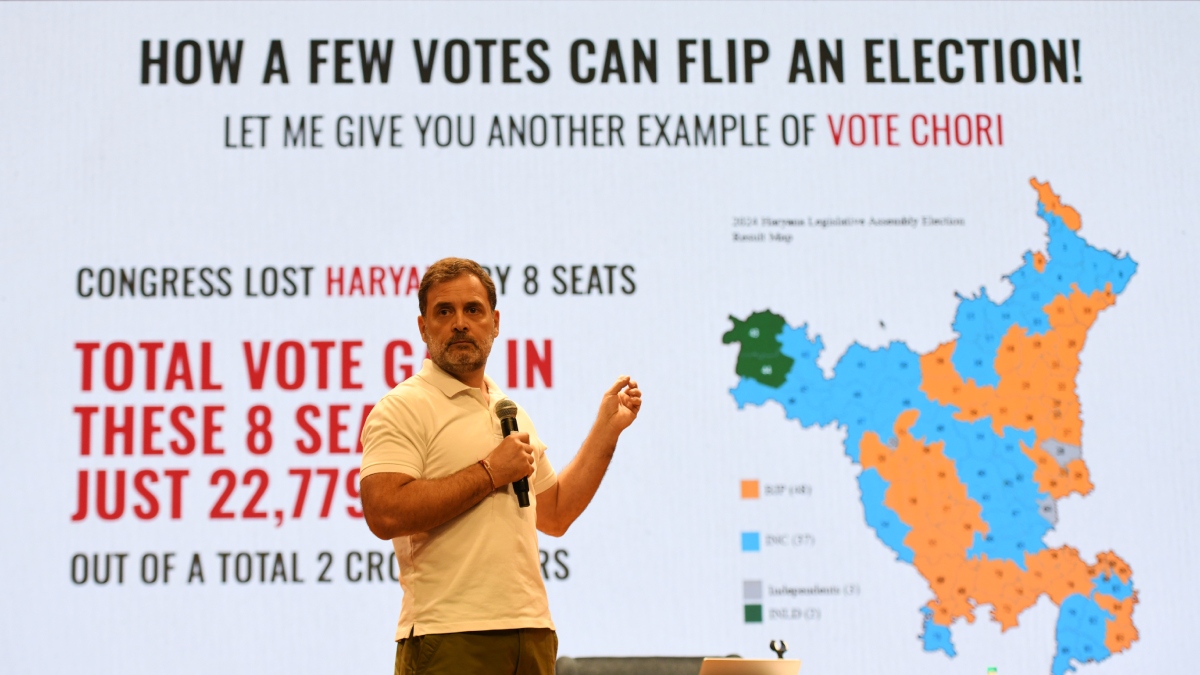'When Opposition leader raises such doubts, it is EC's duty to examine them seriously'

The political battle over electoral integrity in India intensified with Leader of the Opposition Rahul Gandhi alleging “large-scale voter fraud” across the country, while the Election Commission of India (ECI) and the BJP moved quickly to dismiss the charges as unfounded and politically motivated.
Expert opinion on the matter suggests that the issue is “more political in nature” with little legal remedy available. Constitutional interpretation holds that the facts in this case emerged long after the elections were concluded. “Legally, I don’t think there is any remedy available. But politically it is a very potent issue. The allegation is that the Election Commission is acting in collusion with the ruling party and supporting the election in the preparation of electoral rolls. People should be aware,” Constitutional expert and former Lok Sabha Secretary PDT Achary said.
Achary also questioned the move by some state chief electoral officers to demand affidavits from voters, calling it wrong, as such requirements apply only at the stage when electoral rolls are being prepared.
He cited Article 324 of the Constitution, noting that free and fair elections form part of the Constitution’s basic structure. “When doubts are raised by the Leader of the Opposition, and when such a person raises them, it is the duty of the EC to examine the matter seriously,” he said.
According to Achary, Article 324 not only grants the Commission powers but also imposes an obligation to rectify mistakes and assure the public of the electoral process’s integrity. The Article makes it clear that the Election Commission is responsible for conducting elections and preparing the rolls in accordance with the Representation of the People Act, 1950. This responsibility must be discharged in a fair manner, he said, as free and fair elections are part of the Constitution’s basic structure.
If someone goes to court on the issue? Achary said, “there’s no legal remedy because there is a presumption that the electoral roll was prepared properly and that the election was conducted on that basis. Once this presumption is in place, you cannot alter the voter list after the fact.”
Politically, the issue has again pitted Congress against the ruling BJP. The INDIA alliance has also backed Gandhi’s contention.
The Congress leader alleged that in some cases, individuals appeared multiple times in different booths — even across states. In other instances, entire clusters of voters were registered at single-room houses or at implausible addresses such as “house number zero.” He linked the alleged manipulation to instances where election outcomes defied pre-poll surveys and anti-incumbency trends.
The ECI reacted sharply to Gandhi’s allegations, accusing him of misleading citizens. “If the Leader of the Opposition believes what he is saying is true, then he should sign the oath as per the election rules,” the ECI said. “If he does not believe in what he is saying, then he should stop arriving at absurd conclusions and misleading the citizens of the country.”
The BJP also dismissed Gandhi’s allegations, saying the Leader of the Opposition has “deliberately falsified statistics” and was displaying “arrogance” towards the country’s constitutional bodies.
Union Minister Bhupender Yadav presented data to claim that Gandhi’s allegations do not hold ground. Yadav pointed out that in many seats where voter numbers had increased, Congress or its allies in the INDIA bloc had actually won. He cited various examples from the Maharashtra polls arguing that Gandhi’s “narrative collapses under the weight of its own data.”
Rahuk Gandhi’s allegations have cast doubt on the sanctity of electoral rolls and the fairness of elections, placing the onus on the election body to convince voters that due process was followed. As the parliament is already being stalled by the Opposition over the conduct of special intensive revision of electoral rolls in Bihar, the leader of Opposition’s allegation has given another issue to be raised in the parliament.
Even leaders within the Congress were not sure how the issue will pan out in the coming days, given lack of clarity on the legal remedies, but seeks to put the government and the election body in dock.
India